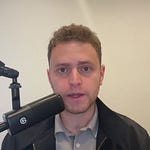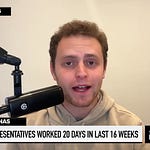This is going to be a deeply personal post, and I want to begin with honesty. If you don’t want to hear more about me, my life story, and the struggles I’ve faced along the way, I respect that—feel free to scroll past this.
But I’m writing this not for sympathy, not for applause, and certainly not for pity. I’m writing because stories matter. Transparency matters. And who I am—both as a journalist and as a human being—is inseparable from experiences that very few people truly know. I don’t want to exist as just a byline or a job title. I want you to understand the person behind it all.
And here’s the truth: if I expect you to trust me with telling the stories of others—the people whose lives I cover, whose struggles I shed light on—then I have to be willing to share my own. Many people run from their past. I’ve chosen the opposite. My past made me who I am, and it fuels the work I do every single day.
That’s why I am so grateful for this platform. It isn’t controlled by billionaires or corporate executives. It doesn’t bow to advertisers or donors. It only answers to you. If you believe in independent journalism rooted in honesty, please consider subscribing to help keep this work alive.
This afternoon, I had the rare chance to stop—really stop. To pause the endless cycle of deadlines, obligations, and constant motion, and instead sit with my memories. I thought not just about the past seven months, but about the past seven years of my life. And when I look back, those seven years feel like decades—years defined by trauma, loss, resilience, and an education that no classroom could provide.
Seven years ago this week, I was 18 years old and walking into law school for the very first time. That alone might sound unusual. What makes it even stranger is that it was the first time I had ever truly left home.
My academic path was anything but normal. I started college at 14, graduating from both high school and college simultaneously at 18. While other kids were navigating dances, football games, and summer jobs, I was sitting in classrooms full of people years older than me—constantly called “Doogie Howser,” expected to perform with a maturity I hadn’t yet grown into.
On paper, it looked extraordinary. In reality, it was isolating. I grew up fast, maybe too fast. I missed the milestones that help young people discover who they are. I had to choose a career before I even had a license to drive. I thought I wanted to be a lawyer, to fight for people who couldn’t fight for themselves. But I didn’t truly understand what that meant.
Arriving at law school at 18 was a shock unlike anything else. I was living on my own for the first time, learning how to navigate a city without family, and trying to keep up in classrooms full of peers who weren’t just older, but also more experienced and more confident. The maturity gap was a canyon, and I felt it every single day.
Still, I was proud. I was the first in my family to graduate college and attend law school. But pride had a price tag: $220,000 in student debt. Every time I signed another loan, I felt the chains tighten around my future. Still, I held on to the dream. Standing up in court one day, defending those who had no one else—that vision kept me going.
Then, everything collapsed.
Two years into law school, my father was arrested. Overnight, I wasn’t Aaron anymore. I was “Lev Parnas’ son.” My last name became a headline. My father’s face—and mine—were plastered across televisions and newspapers. My own identity vanished under the weight of his.
I wasn’t his lawyer, but I had to become one in spirit. I spent sleepless nights digging through documents, helping my family process the chaos, all while trying to survive law school myself. Job offers I had worked years for disappeared. The legal community slammed doors in my face—not for what I had done, but because of my last name.
And then came the conviction. My father was sentenced to twenty months in federal prison. Suddenly, I wasn’t just a young law student drowning in debt. I was the emotional and financial backbone of my family. Once again, I had to grow up before I was ready.
The past seven years have left scars—ones I will carry forever. They’ve been filled with trauma, humiliation, and nights where I wondered if I could keep going. But they’ve also taught me resilience. They’ve shown me what it means to rebuild when everything crumbles. They’ve forced me to hold onto my identity even when others tried to erase it.
I don’t share this for pity. I share it because it explains why I approach journalism the way I do. Why truth, accountability, and empathy are not just professional values to me—they’re personal imperatives. I know what it’s like to be defined by a headline. I know the human cost of scandal. And I know how much it matters to tell the full story, not just the convenient one.
That’s why I want to do more than just report news. I want to tell the story behind the story. The story of the person behind the headline. Because people matter. Their pasts matter. Their humanity matters.
That means shining a light where others won’t: on federal employees who were purged by Donald Trump. On the community of Boxtown, Tennessee, suffocating under pollution from Elon Musk’s xAI project. On the hidden histories of members of Congress and world leaders.
I want to put my investigative skills to work in a way that most outlets won’t. I want to dig deeper, ask harder questions, and bring forward the human truth that is too often ignored.
This is the next chapter of my work. And I hope you’ll be part of it.










